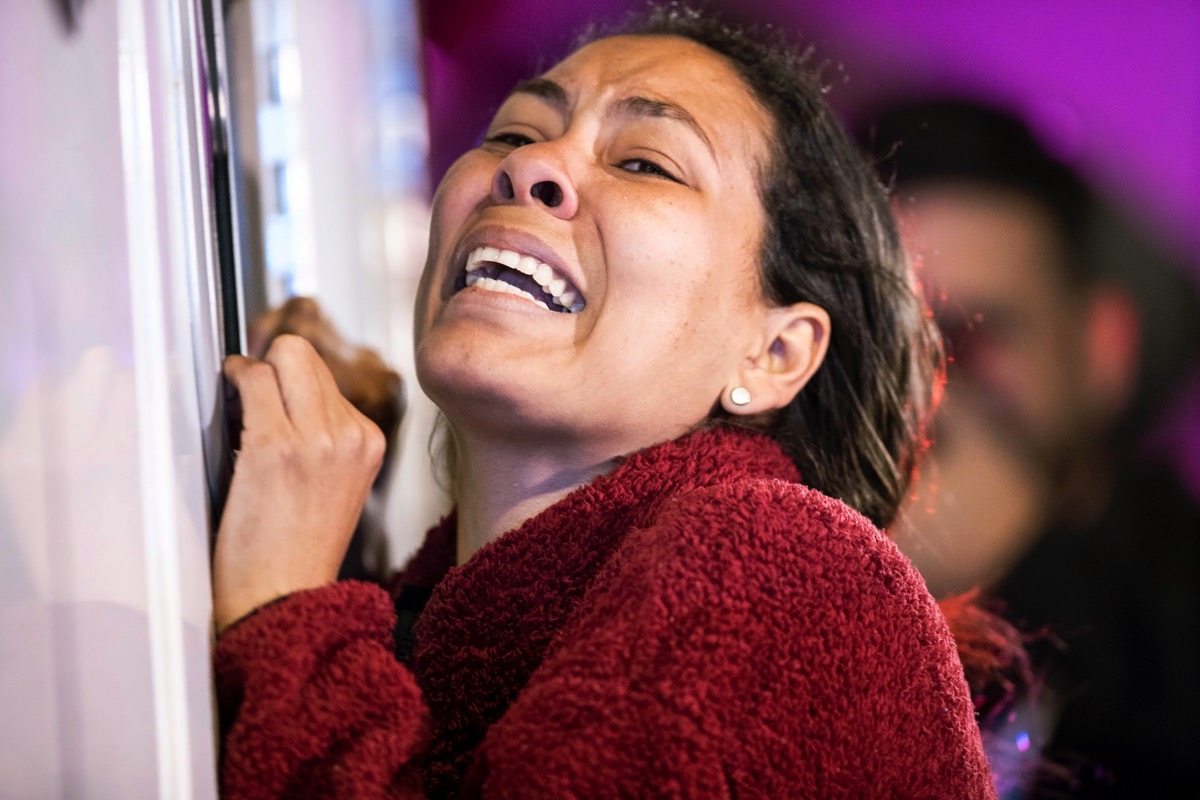

A migrant cries leaning on an ambulance as a person she knows is attended by medics after a fire broke out at the Mexican Immigration Detention center in Ciudad Juárez on Monday, March 27, 2023. A fire in a dormitory at a Mexican immigration detention center near the U.S. border left more than three dozen migrants dead. It was one of the deadliest incidents ever at an immigration lockup in the country. (Omar Ornelas /The El Paso Times via AP)
By MARÍA VERZA, Associated Press
MEXICO CITY (AP) — Migrants fearing deportation set mattresses ablaze at an immigration detention center in northern Mexico, starting a fire that left 39 dead, the president said Tuesday following one of the deadliest incidents ever at an immigration lockup in the country.
Hours after the fire broke out late Monday, rows of bodies were laid out under shimmery silver sheets outside the facility in Ciudad Juárez, which is across from El Paso, Texas and a major crossing point for migrants. Ambulances, firefighters and vans from the morgue swarmed the scene.
Thirty-nine people died and 29 were injured and are in “delicate-serious” condition, according to the National Immigration Institute. There were 68 men from Central and South America held in the facility at the time of the fire, the agency said. A Guatemalan official said many may have been from that Central American country.
President Andrés Manuel López Obrador said the fire was started by migrants inside the facility in protest after learning they would be deported.
“They never imagined that this would cause this terrible misfortune,” López Obrador said, adding that the director of the country’s immigration agency was on the scene.
Tensions between authorities and migrants had been running high in recent weeks in Ciudad Juárez, where shelters are full of people waiting for opportunities to cross into the U.S. or who have requested asylum there and are waiting out the process.
More than 30 migrant shelters and other advocacy organizations published an open letter on March 9 that complained of the criminalization of migrants and asylum-seekers in the city. It accused authorities of abuse and using excessive force in rounding up migrants, complaining that municipal police were questioning people in the street about their immigration status without cause.
The high level of frustration in Ciudad Juárez was evident earlier this month when hundreds of mostly Venezuelan migrants acting on false rumors that the United States would allow them to enter the country tried to force their way across one of the international bridges to El Paso. U.S. authorities blocked their attempts.
The national immigration agency said Tuesday that it “energetically rejects the actions that led to this tragedy” without any further explanation of what those actions might have been.
In recent years, as Mexico has stepped up efforts to stem the flow of migration to the U.S. border under pressure from the American government, the agency has struggled with overcrowding in its facilities. And the country’s immigration lockups have seen protests and riots from time to time.
Mostly Venezuelan migrants rioted inside an immigration center in Tijuana in October that had to be controlled by police and National Guard troops. In November, dozens of migrants rioted in Mexico’s largest detention center in the southern city of Tapachula near the border with Guatemala. No one died in either incident.
Mexico has emerged as the world’s third most popular destination for asylum-seekers, after the United States and Germany, but is still largely a transit country for those on the way to the U.S. It holds tens of thousands of migrants in an expansive network of detention centers and attempts to closely monitor movements across the country in cooperation with American authorities.
Karla Samayoa, spokeswoman for Guatemala’s Foreign Ministry, said that Mexican authorities had informed them that more than two dozen of the migrants who died appeared to be from the country.
Asylum-seekers must stay in the state where they apply in Mexico, resulting in large numbers being holed up near the country’s southern border with Guatemala. Tens of thousands are also in border cities with the U.S., including Ciudad Juárez.
—
Associated Press writer Sonia Pérez D. in Guatemala City contributed to this report.



[…] tragic events such as this, it is essential to have Latinas in newsrooms. María Verza for the Associated Press covered what is now one of the deadliest incidents ever at a detention center in Mexico. Vanessa […]